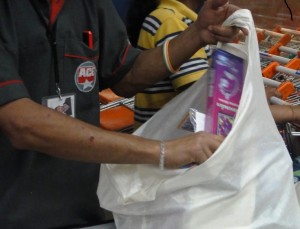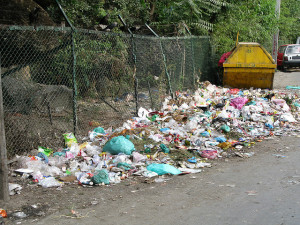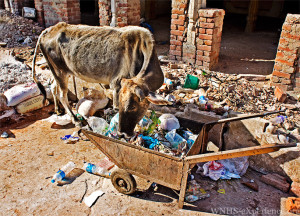Do you know that every year, around 720-1200 crore litres of oil is used in the production of plastic bags? And that each person uses about 1200 plastic bags a year? Phew! Talk about the oil crisis in countries!!
Everywhere you turn, you see plastic bags strewn carelessly on the roads, just like that! As it is India that we’re living in, you can very well say that these bags can be found everywhere but the trash cans. Also we know that plastic is not easily degradable and stay for a long time in the environment. Even if they do degrade, they break down into smaller toxic components that are harmful for the environment, especially the soil by reducing its fertility and in turn, this becomes a problem for the plants and organisms living underneath the soil.
But in today’s world there has been an upsurge in the usage of plastic bags especially in the Indian households since the 1990s. We are, in fact doing the opposite of what we were taught to do as a child. We are depending more and more on plastic materials just because they are cheap and thereby ignoring whatever had been taught to us since our second grade.

We ought to owe that especially to the increasing consumer stores which attract people of India with their attractive sales and offers. With the stores providing an easy provision to carry our purchase, I’m pretty sure that there are at least two plastic bags in your house which carry smaller carry bags that carry even smaller bags! And I’m not kidding myself if I say that I haven’t thought of reducing my shopping habits. It is really tough when two of the things that you care about the most conflict each other. In my case, it is environment and shopping. Hey! I’m a typical girl. Shopping is in my blood, figuratively. But I’m trying my best, though.
Now here’s a happy thought. Maybe if there were some local ways to recycle or reuse these bags and make us guilt-free so that we can shop more! Over the course, I have learnt a few things that have proven to increase the reuse of the plastic bags already available at home and apparently seem to decrease our guilt towards our environment.
Here are a few try-at-home stuff that works:
– For all those shopaholics out there, the next time you go out for shopping, taking your own bags might be the first step that you take towards helping the environment. Although paper bags offer an added advantage of being biodegradable, they are not good for the trees that are being cut down for this purpose. So the next time some store gives you paper bags, please say ”No, thanks!”.
– Instead of buying new bin bags and increasing the amount of plastic that is already present, reuse the old bags as trash bag. It is said that one plastic bag can be reused over a hundred times though here one cover can be reused only once. But hey, reusing the plastic is what matters.
– If you have a pet at home, you can reuse these bags to dispose the pet faeces. While taking your dog out for walking, remember to bring a scoop and a plastic bag to erase any evidences of your dog crapping there. Otherwise, trust me, you’ll be in trouble with the road workers. If you have a cat, you can lay the plastic cover at the bottom of the kitty-litter tray and while throwing it out, you can wrap it up as such and dispose it. Easy and not messy.
– Smaller bags can be used to wrap easily perishable food and store it in refrigerator instead of zip pouches. This preserves the freshness and prevents the food from drying. But one cover can be used only once or twice before they catch on an odour.
– While going on long trips away from home, you can bring a few extra plastic covers to carry back your laundry. You don’t want them mixing with your other fresh clothes, otherwise that might be a problem.
– Some plastic bags can be taken while on short trips like to the parks or zoos or the amusement parks. So if you cannot find a trash can nearby, you can just use the bags that you bought instead of littering the place. You can reuse the plastic while also keeping the place tidy. One stone, two birds, right!
– For those who regularly put on shower caps, tying a plastic bag over the head actually works better.
– While packing parcels to relatives and friends who live away from you, please do so in plastic covers. Who knows when these plastic covers might come handy for them.
– You can also wrap the gift articles, souvenirs from your other trips, or the mementoes you received or the prizes that you won with these covers, keeping them from getting rusted or dusty.
– On a rainy day, you can protect your college/school bags by covering them with plastic bags. These bags prevent the entry of water and protect your books. You can also cover the electronic items like mobiles, pagers or beepers with these covers.
– While displaying their artistic skills, children tend to colour the floor since they see it as a big, huge, canvas. You can protect the floor in your house by placing a plastic cover under the paint boxes.
– You can also try your hands at creating some articles that put the waste covers to use. I heard that a tribe in Africa collects plastic bags and makes hats, bags and other goods out of them. If they can do it, why can’t we make our own ‘’wealth-from-waste’’ stuff.
The above are just a few tips that I thought of but then there are always other ways that you can think of. There’s always an option for recycling plastic things. You can give the plastic bags and covers for recycling 00if there are any places nearby that do the recycling. Maybe our dream to create a plastic-free or rather, plastic-‘’less-than-there was-before’’ surroundings need not be that far.
Summing up, there are many ways to continue shopping without ever having to be guilty. The above tips/methods are simple, easy-to-do and really comfortable since we already have the raw material in our hands. The only thing left to do is the processing, or in this case reusing. Maybe it’s not too late to save Mother Earth!



Leave a Reply